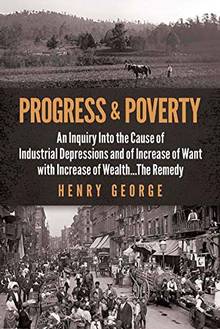Progress and Poverty: An Inquiry Into the Cause of Industrial Depressions and of Increase of Want With Increase of Wealth
Henry, George
Éditeur : DOVER PUBLICATIONS
ISBN papier: 9780486842080
Parution : 2020
Code produit : 1421040
Catégorisation :
Livres /
Gestion /
Économie /
Ouvrages généraux
Formats disponibles
| Format | Qté. disp. | Prix* | Commander |
|---|---|---|---|
| Livre papier | En rupture de stock** |
Prix membre : 27,90 $ Prix non-membre : 31,00 $ |
*Les prix sont en dollars canadien. Taxes et frais de livraison en sus.
**Ce produits est en rupture de stock mais sera expédié dès qu'ils sera disponible.
Description
Progress and Povertyoffers a fundamental inquiry into the cause of industrial depressions and the persistence of poverty and advancing wealth. Upon its 1879 debut, it quickly became the bestselling book on economics and was a principal inspiration for the United States' Progressive Era of the 1890s through the 1920s. It also influenced major public and political figures such as Albert Einstein, Winston Churchill, and Sun Yat-sen. Henry George proposed a "single tax" that would assess the value of land—not buildings or other enhancements, just the land itself. He maintained that society as a whole would share in the benefits: wages could be raised, the use of land improved, and there would be no need to tax productive activity. Land speculation would be discouraged, and development would be promoted. In elaborating upon these ideas, George addressed many economic subjects, such as tariffs and trade, currency, interest, capital, economic cycles, and other social issues.























